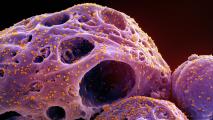
Biotech
Human history has been all but defined by death and disease, plague and pandemic. Advancements in 20th century medicine changed all of that. Now advancements in 21st century medicine promise to go even further. Could we bring about an end to disease? Reverse aging? Give hearing to the deaf and sight to the blind? The answer may be yes. And soon.
More
After studying 850 hours of footage, this paper offers 3 rules for a great conversation
Good conversations leave a lasting impression. They are rewarding and enriching. Here’s how to have more of them.
Where are the universal coronavirus vaccines?
Universal coronavirus vaccines that protect against all known variants of COVID-19 — and ones that don’t exist yet — are closer than ever.
Study finds exactly how long people want to live: it isn’t forever
Most people prefer a shorter life if they have dementia, chronic pain, or are a burden to their families.
New “Lattice” device tests drugs on eight organs at once
Northwestern University scientists have developed a device that simulates up to eight organs at once to aid drug development.
New CRISPR system is 66% smaller but just as powerful
A new CRISPR system is just as efficient as CRISPR-Cas9 but much smaller, which could make it easier to deploy in people.
These earbuds analyze brain activity and sweat content
A flexible sensor turns a pair of earbuds into a health monitoring device capable of recording brain activity and analyzing sweat.
Jellyfish surprise scientists by learning without a brain
Researchers demonstrate that Caribbean box jellyfish don’t just float around aimlessly. They learn and adapt to their environment.
Is iron the Achilles’ heel for cancer?
Some cancer cells store high quantities of iron. Iron-activated cancer drugs selectively disrupt cancer cells, without harming healthy cells.
Adding spider DNA to silkworms creates silk stronger than Kevlar
Spider silk is strong and tough, but hard to farm. Silkworm silk is easy to farm, but not that strong. What if we could combine the two?
Octopus tentacle-like patch delivers drugs through your cheek
A needle-free drug delivery system inspired by octopus tentacles could one day replace injections for administering biopharmaceuticals.
ChatGPT forces us to ask: how much of “being human” belongs to us?
Large language models have been trained on massive amounts of “natural” human language — just like us. Does this make the robots part human?
Rare mutation may counteract “Alzheimer’s gene”
A rare mutation suggests that using CRISPR to reduce the expression of the APOE-e4 gene could help treat or prevent Alzheimer’s.
New CRISPR tool has an “on/off” switch
By splitting a base editor into two parts, researchers could give it an “on/off” switch that appears to make it safer and more effective.
CRISPR is helping “de-extinct” the Tasmanian tiger
“De-extinction” researchers believe they might be able resurrect the Tasmanian tiger and restore ecological balance in Australia.
New “multipronged” gene therapy reverses paralysis in mice
A new gene therapy that guides nerve regeneration across complete spinal cord injuries restored the ability to walk in paralyzed mice.
Artificial wombs for preemies move closer to human trials
A panel of FDA advisors has met to discuss the development of artificial wombs designed to help extremely premature babies survive.
Gene-edited pig heart gives a dying man a second chance at life (Updated)
For the second time ever, a gene-edited pig heart has been transplanted into a person with terminal heart disease.
An implantable device could enable injection-free control of diabetes
MIT engineers designed an implantable device that carries islet cells along with its own on-board oxygen factory to keep the cells healthy.
Spending time in space can harm the human body − but scientists are working to mitigate these risks before we go to Mars
With NASA planning more missions to space in the future, scientists are studying how to mitigate health hazards that come with space flight.
Subscribe to the newsletter































